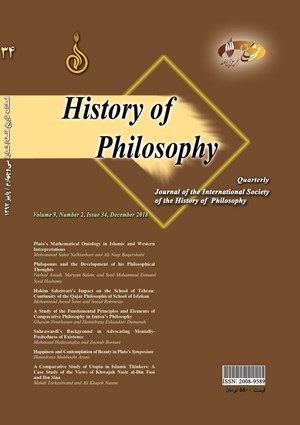A Comparative Study of Utopia in Islamic Thinkers: A Case Study of the Views of Khwajah Nasir al-Din Tusi and Ibn Sina
Subject Areas : ریشهشناسی مکاتب و آراء فلسفی در ادوار قدیم و جدیدMahdi Torkashvand 1 * , Ali Khajeh Naieni 2
1 -
2 - University of Tehran
Keywords: Utopia ideal city Islamic thinkers Khwajah Nasir al-Din Tusi Ibn Sina ,
Abstract :
The negation of painful worldly affairs and trying to depict a purely good world in the mind of a human being who has experienced a descent from heaven to the earth has a long history. This thought has resulted in the development of the idea of Utopia by Western and Eastern thinkers. Khwajah Nasir al-Din Tusi and Ibn Sina are among the scholars who have theorized in this regard and elaborated on the various dimensions of their own Utopia. The present study was conducted using a descriptive design and examining the existing documents regarding Ibn Sina and Tusi’s views of Utopia. The results of the study indicate that the differences between their descriptions of Utopia pertain to their theoretical approach, their views of the kind of leadership and attributes of the head of Utopia, Ibn Sina’s hierarchical and class-oriented view, and an accurate view of the components of Utopia in Ibn Sina’s philosophy in comparison to Tusi, while they both agree with each other with respect to their worldviews, the conditions they set for attaining the leadership of Utopia, and compromising view of the existing status. Evidently, given the Islamic worldview of both thinkers, the findings of this study could be a useful first step for portraying an Islamic city.
آل عمران، رؤيا؛ شيشوان مداين، سيده فهيمه؛ آل عمران، سيدسجاد، «بازخواني آرمانشهر از ديدگاه قرآن کريم»، فصلنامه مطالعات قرآني، س4، ش14، 1392.
ابنسينا، حسين، الهيات من در کتاب الشفا، تحقيق حسن حسن زاده آملي، قم، انتشارات دفتر تبليغات اسلامي حوزه علميه قم، چ2، 1376.
احمدي، حسن؛ افرادي، کاظم، «سير تفکرات پيرامون مدينه فاضله در جهان اسلام»، آموزههاي فلسفه اسلامي، دانشگاه علوم اسلامي رضوي، ش11، 1391.
اسفندياري و همکاران، آرمانشهر اسلامي از منظر امام رضا(ع)، فصلنامه فرهنگ رضوي، س4، ش15، 1394.
اصيل، حجت الله، آرمانشهر در انديشه ايراني، تهران، نشر ني، 1381.
افضلي، سيدعبدالرئوف؛ لکزايي، نجف، «آرمانشهر ملاصدرا؛ ارکان و ويژگيها»، فصلنامه علوم سياسي، س16، ش63، 1393.
برخورداري، عارف، «درآمدي تطبيقي بر ماهيت مدينه فاضله در آراي فارابي و خواجه نصيرالدين طوسي»، فصلنامه سياست، مجله دانشکده حقوق و علوم سياسي، دوره 45، ش2، 1393.
پورداوود، ابراهيم، يادداشتهاي گائاها، تهران، انتشارات دانشگاه تهران، 1356.
جمعي از نويسندگان، «مدينه فاضله به تصور غربيها»، دائرة المعارف آمريكا، ترجمه محمود شهيدزاده ماهاني، بي¬نا، 1360.
حلبي، علي اصغر، فلاسفه ايراني، تهران، انتشارات زوار، 1361.
حيدري، فاطمه، چشماندازهاي آرمانشهر در شعر فارسي، چ1، تهران، انتشارات دانشنگار، چ1، 1382.
حيدري، فاطمه، «قاف شهر آرماني، سيمرغ شاه آرماني»، فصلنامه تخصصي زبان و ادبيات فارسي دانشگاه آزاد اسلامي مشهد، ش10، 1396.
شيخي، محمد، «ساختار محله¬اي در سرزمينهاي اسلامي»، فصلنامه علوم اجتماعي، دوره10، ش22، 1382.
طوسي، خواجه نصيرالدّين، اخلاق ناصري، ترجمه مجتبي مينوي و عليرضا حيدري، تهران، انتشارات خوارزمي، چ4، 1369.
گوهرين، سيد صادق، شرح حال حجت الحق ابوعليسينا، تهران، انتشارات کتابخانه تهران، 1331.
لنكستر، لين و.؛ برسفورد فاستر، مايكل؛ تامس جونز، ويليام، خداوندان انديشه سياسي، ترجمه جواد شيخ الاسلامي، تهران، انتشارات علمي و فرهنگي، ج1، 1373.
مبلغي، عبدالحميد؛ محمدي¬کيا، طيبه، «نگاهي به آرمانشهر سينوي»، دو فصلنامه علمي- پژوهشي حکمت سينوي، س19، ش53، 1394.
محمدي ري شهري، محمد، فرهنگنامه آرزو قم، دار الحديث، 1376.
مشهدي¬زاده دهاقاني، ناصر؛ تحليلي از ويژگيهاي برنامه¬ريزي شهري در ايران، تهران، انتشارات دانشگاه علم و صنعت، چ2، 1374.
مطلبي، مسعود؛ نادري، محمد مهدي، «بررسي تطبيقي مفهوم آرمانشهر در انديشه سياسي اسلام، ايران و غرب»، نشريه مطالعات سياسي، ش6، 1388.
منفرد، بهروز، «چيستي اتوپيا»، مشرق موعود، ش5، 1387.
يوسفيان، حسن؛ علي¬پور، محمدصادق، «فلسفه امامت در انديشه فارابي»، فصلنامه فلسفه دين، ش10، 1390.
Aisha Khan, Avicenna (In Sian): Muslim Physician and Philosopher of the Eleventh Century, Rosen Pub Group, New York, 2006.
Bloch, Ernst, The Principle of Hope, MIT Press, Cambridge, 1986.
Kumar Krishnan, Utopia and Anti-Utopia in Modern Times, Oxford and New York, Blackwell, 1987.

